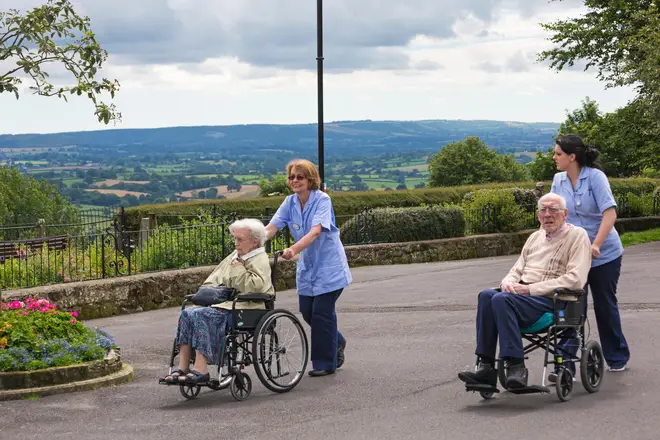
Iain Dale 7pm - 10pm
18 November 2021, 00:17

England's poorest pensioners face paying more in social care costs after the government "sneaked out details" on the new cap on home and care costs.
The proposals, which will be voted on by MPs next week, state only the amount that individuals directly contribute to their social care costs will count towards the lifetime cap of £86,000.
Means-tested money received from the state or financial support for care from the local authority will not count as part of the key reform which was announced earlier this year.
This is to ensure that people "do not reach the cap at an artificially faster rate than what they contribute", the Department of Health and Social Care (DHSC) said.
But the details have been met with criticisms by some who warn the "unfair" proposals will hit the poorest pensions hardest.
The proposals could see those with less than £100,000 in assets paying a larger proportion than those with large savings.

'They are going to have to pay for their own social care'
Read more: MPs pass 'watered down' Tory plans for second jobs amid sleaze allegations
Read more: Boris Johnson: Owen Paterson did break rules and I made a 'total mistake'
A pensioner with £90,000 in assets may end up contributing the same amount for their care as someone with assets worth £500,000.
The cap will also not cover daily living costs, which will be set nationally at £200 a week to cover non-care fees such as rent, food and utility bills, the Government said.
Liz Kendall, Labour's shadow social care minster said the government "sneaked out details" adding: "It has now been revealed that the poorest pensioners will have to pay even more, something Andrew Dilnot - who proposed the cap - explicitly ruled out because it was so unfair.
"That this Tory Government has failed to be straight with those who've given so much to our country is a total disgrace, but utterly unsurprising. Our elderly people deserve better."
In a policy paper uploaded on Wednesday, the Government said it plans to amend the Care Act to ensure the new reforms are clear, subject to parliamentary approval.
It added that the "much more generous" means test that accompanies the cap will be the main way of helping people with fewer assets.
The document published on Wednesday says local authorities will start a care account for each individual eligible for or receiving care, and will monitor their progress towards the cap.
Read more: Eco mob behind bars: Judge jails protesters for M25 travel chaos
Read more: Cricket racism: Five more clubs embroiled in scandal, Azeem Rafiq tells LBC

Shelagh Fogarty's monologue on the 'bonkers' adult social care system
It says: "For individuals who receive financial support for their care costs from their local authority, it is the amount that the individual contributes towards these costs that will count towards the cap, subject to parliamentary approval."
Torsten Bell, chief executive of the Resolution Foundation, said the change will "reduce how much protection the cap provides to those with fewer assets, by making it less likely that they could benefit from the cap".
He said: "The Government is rightly making long overdue reforms to better protect the assets of those unlucky enough to need social care support, with a more generous means test and cap on total costs.
"But the Government is now seeking to change how the means test and cap interact, leaving people with fewer assets receiving far less protection than expected.
Read more: Boris Johnson faces down Tory rebellion as he wins vote on social care tax increase
Read more: Sajid Javid: Health and social care 'begins at home' not with government
"What sounds like a technical change will actually make a huge difference to how much families have to pay for care.
"The danger is that the cap on care costs will now offer little protection for poorer households' assets, while doing much more for those with significant assets - especially in the south of England. We need far greater scrutiny of such a major change."
Sir Andrew and Ms Warren are set to appear before a Commons select committee on Thursday morning to discuss the Government proposals.